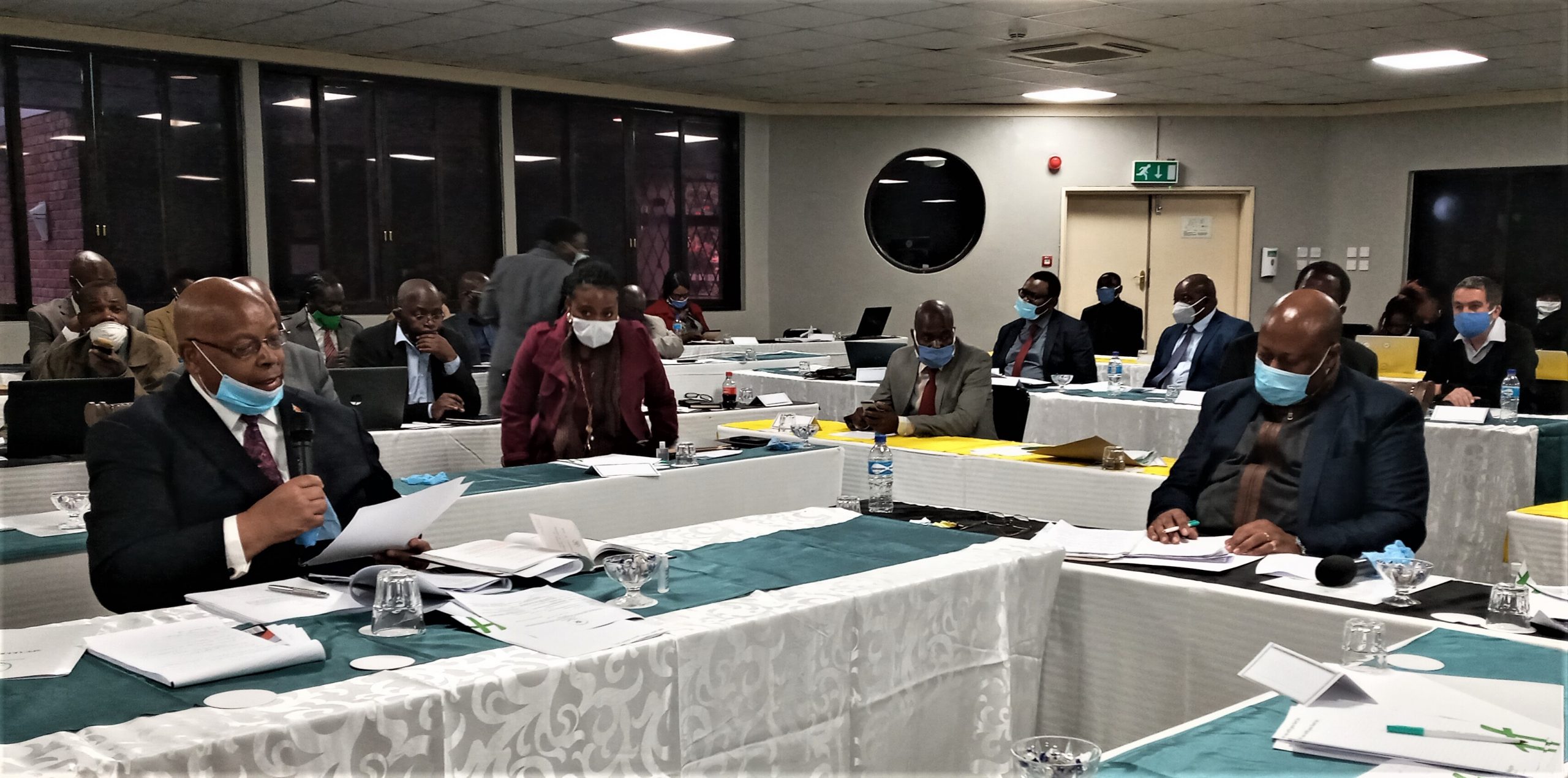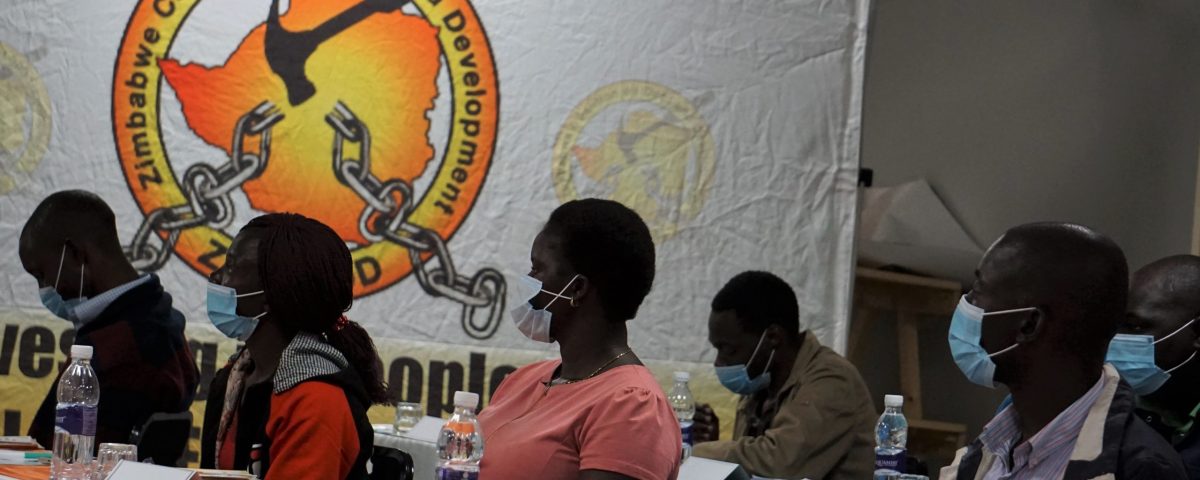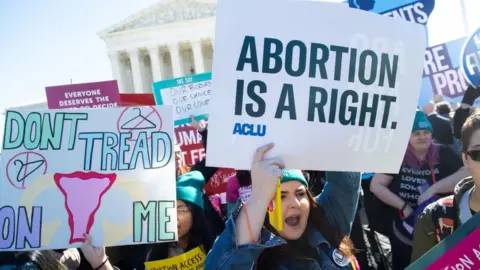
AGs Office grilled to expedite editing Mines and Minerals Bill
August 14, 2020
Late diamond kingpin ‘Boss Bothy’ still remembered nine-years on
August 25, 2020Mining profits overlap community welfare, the saga continues under Covid-19

Part of the delegates at the 2020 Manicaland Provincial Mining Indaba (PAMI) held in Mutare last Saturday
…ZIMCODD calls for progressive taxation under covid-19
Nyemba added that in order to bridge the gap of inequality, Government should make commitments to reduce inequality and policy choices to protect its people such as the introduction of progressive taxation. A progressive tax is a tax in which the tax rate increases as the taxable amount increases, which imposes a higher rate on the rich than on the poor.
Eve Mamoyo
THE saga of mining profits overlapping community welfare continues under covid-19 measures as communities in Chiadzwa expressed discontentment about the measures put in place to help reduce the spread of the global pandemic by the Zimbabwe Consolidated Diamond Company (ZCDC) employees living among them.
This was highlighted during the 2020 Manicaland Provincial Mining Indaba (PAMI) held in Mutare last Saturday. Running under the theme, “The Impact of Covid 19 on the extractive sector: Amplifying Community Voices in Fighting Inequality and Mining Related Injustices,” this year’s provincial indaba was in cooperation facilitated by Zimbabwe Coalition on Debt and Development(ZIMCODD), Zimbabwe Council of Churches(ZCC) and Zimbabwe Environmental Law Association(ZELA).
This year’s PAMI which adhered to the covid 19 regulations, unlike before had limited number of participants drawn from key stakeholders including local government authorities, community based organisations (CBOs) and traditional leaders.
The community based organisations (CBOs) in mining areas in and around Mutare said Government pushed to categorise mining as an essential service during the pandemic, enabling operations to continue despite substantial risk. In doing so, they have become key vectors for the spread of the virus and are putting communities, rural and urban populations, and their workforces, at great risk.
Abigail Musiya of Marange Development Trust (MDT) said mining operations in Chiadzwa continued as normal, but little has been done to protect communities that are at risk of mingling with employees coming from covid19 hotspot areas. “Mining companies need to step up efforts on community awareness on the covid 19 pandemic. The provincial covid 19 taskforce must extend its scope on awareness to rural areas, Marange in particular, and step up contact tracing and testing in the mining communities,” said Musiya.
She said in many cases rural people in the mining communities already face acute risk from the virus, especially communities whose health has been impacted by contamination generated by mining extractivism. Musiya added that they are struggling to protect themselves from potential outbreaks given the fact that some of the employees at ZCDC come from hotspot areas in Harare, and are allowed to travel home during shift changes or leave days, which increases chances of intermingling with communities and possible transmissions from other provinces.
Lloyd Sesemai of Zivai Community Empowerment Trust (ZICET) said in Penhalonga though Redwing is currently shutdown artisanal mining is being done clandestinely. “The influx of people coming to Penhalonga on a daily basis, with no covid 19 regulations being enforced and no monitoring, this is a ticking time bomb. After that they go to the shopping centres and buy food interacting with unsuspecting children and women. Prevention is better than cure. Let’s not wait for an outbreak to react,” said Sesemai.
Mutare Rural District Council chief executive officer Shepherd Chinaka said the Constitution speaks to the aspect of national development whereby the State must ensure that local communities benefit from the resources in their areas. “Section 13 (4) of the Constitution compels the State to put mechanisms to ensure communities benefit from local resources in their localities. During disasters like cyclone Idai and Covid 19 investors must respond to the plight of communities and ensure they contribute towards local communities and business initiatives as people on ground are eager to develop and empower themselves,” he said.
Chinaka however said there is need to work together to promote the country’s business environment and be inclusive in all processes. “Community voices must be amplified for the common good and I urge investors to remit to the State as expected…It is important that investors consult and involve communities in development of socio economic projects. I encourage sustainable development through leaving no one behind,” said Chinaka.
ZELA deputy director Shamiso Mtisi said ZELA has collected data on the impact of covid 19 in mining communities. Mtisi also spoke about how public resources management should be about making sure resources are vested in government as the custodian on behalf of the people to benefit the people. “That is why we speak of bridging inequalities in the extractive sector and that gap should be bridged,” he said.
In her presentation on grievances redress mechanisms, Fadzai Midzi from ZELA said the grievances redress mechanism helps in effectively addressing grievances which most communities go through. She said it is a mechanism to receive, process and act on complains and grievances reported by the community of a company or public citizens, giving their complaints to a Government service. “As ZELA we saw it as an opportunity that if there are grievances redress mechanisms we will know how and where complains are received, so there is a follow up mechanism and monitoring mechanism. The mechanism gives guidance to the coperates on how to handle the issues. Good grievances redress mechanisms ensure ownership, accountability, transparency and responsibility,” said Midzi.
Eve Nyemba from ZIMCODD concurred that inequalities have been intensified by the covid 19 pandemic. “When seeking healthcare a covid-19 certificate is required before you are attended to. In the education sector there is online learning and only those with money can afford, which has led to people venturing into illegal mining, so that their children can also access online classes. If we look at nutrition how many families can afford two meals, access to online and in reality mobile technology increases exclusion for the poor and marginalized,” she said.
Nyemba added that in order to bridge the gap of inequality, Government should make commitments to reduce inequality and policy choices to protect its people such as the introduction of progressive taxation. A progressive tax is a tax in which the tax rate increases as the taxable amount increases, which imposes a higher rate on the rich than on the poor.
“Our recommendation as ZIMCODD is that Government should increase on social spending, health care, improved education opportunities for the marginalized and put mechanisms to ensure gender equality is respected… At the moment government taxes less to attract FDI (foreign direct investment), but it is at the expense of the poor as there will be less resources to spend on people. It is time to advocate for progressive taxation and increased social spending by government in the extractive sector,” said Nyemba.


